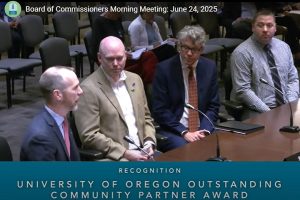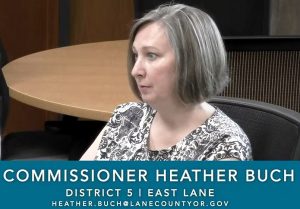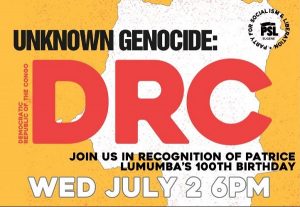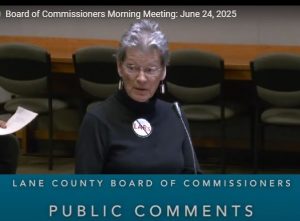Youth Radio Project interviews Andrew Rosenthal
10 min read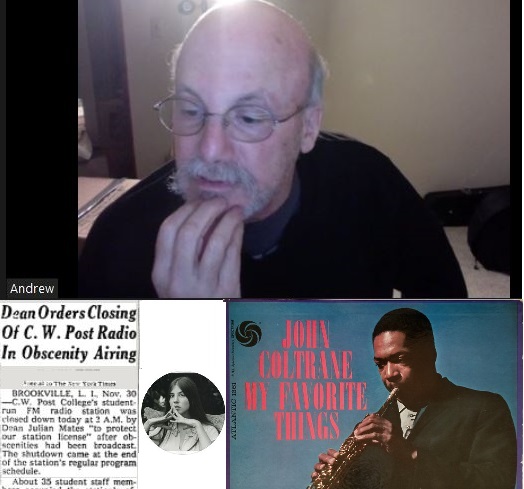
Journey: You’re listening to KEPW LP 97.3 FM, also simulcasting at kepw.org. I am Journey, I’m here with Andrew.
[00:00:09] John Q: Youth Radio talks with longtime producer Andrew Rosenthal.
[00:00:14] Andrew Rosenthal: You know, you can ask me anything you want about radio.
[00:00:17] From 1968 to 1970, the DJs used to put music together, making messages—usually anti-war messages about Vietnam. So I said, ‘Oh, I would like to do that. I think I could do that.’
[00:00:30] So then I went to CW Post College in Brookville, Long Island, New York, which was not too far from where I lived, and I started school, and WCWP was a college radio station. And I never actually got on the air there, ‘cause radical politics started right away. You see, they hired Steve Post from WBAI, part of the five-station group of Pacifica stations—KPFA in Berkeley was the first independent listener-supported non-commercial community radio station.
[00:01:04] Long story short, they hired Steve Post to take care of radio at the school, you know, and he told them what he was going to do, and he did it, and then they fired him. So we all sat in at the station for about a little over a month, and then they came by and they changed the locks on the radio station. We got locked out.
[00:01:26] Bill Kunstler became our lawyer because of First Amendment rights. And we went into a court in Brooklyn and the judge says right away, he says, ‘Mr. Kunstler, you shouldn’t even be here.’ Because of the Chicago Seven, you know? Actually, he did—no, he said, ‘You can leave,’ and he did throw him out of court. And there had been a little demonstration in front of the courthouse and so that kind of fizzled down.
[00:01:53] So that was my first introduction to radio and I was going to do a weekly blues show of just acoustic and electric blues, you know, from Howlin’ Wolf and people like that. And I never got to do that.
[00:02:05] And I went to Trenton State College ‘cause they had a radio station. At that point, I had known about freeform radio. I had heard about it. I said, ‘I’ll do a freeform show every week.’ So I did, and every week I went into the studio with a box of records, vinyl LPs, I just chose from in front of me whatever I wanted to do, whenever I wanted to do it.
[00:02:26] I’ve done interviews with friends, never with any family members, but I’ve done a lot of interviews with different well-known and not-so-well-known musicians.
[00:02:36] I got to interview Essra Mohawk. She might have been my first interview. She’s a vocalist/pop singer from Philadelphia, so that was fun.
[00:02:45] I’ve done a lot of solo radio shows where I was the engineer and the announcer/producer. That’s how I’ve done most of my radio, and I started radio in 1971 and I’ve worked at eight radio stations, and all those stations, I pretty much did the whole thing myself.
[00:03:06] Now, when you get into commercial radio, you have your own engineer, so you have an engineer who queues up records for you. And you just play with the microphone. And in a way that’s a lot easier because when you have to keep your mind on all the equipment things, plus on how you want to be spontaneously creative on the air, sometimes it’s a little bit much.
[00:03:29] Journey: I was thinking like music stations where people request songs.
[00:03:34] Andrew Rosenthal: I did that spontaneously. I left it up to the listener, I said, here’s the phone number. If you want to call and request a tune, and I happened to have it either with me or it’s in the library. I’m happy to play it.
[00:03:46] KLCC was formatted as a jazz station at the time. I was a big John Coltrane fan and he did a song called ‘My Favorite Things,’ which originated from Broadway, but people called me so often to play ‘My Favorite Things’ that I finally said, ‘No, I don’t think I’m going to play that. He has such a wealth of material, you’re missing a lot of his great work. I’m going to play some other things. Thank you for calling.’ I was just tired of playing ‘My Favorite Things,’ that’s all.
[00:04:17] At KLCC, they had some restrictions in their jazz and there was a music director and he guided the restrictions, and he would do color-coding the music. He would get records in from record companies.
[00:04:32] He would listen to them first, and if the tune was sort of mellow, he would mark it blue. If it was a little more up-tempo, he would mark it yellow. If it was a little more up-tempo, he would mark it red. And if he didn’t want to go on the air because it was too up-tempo, he would mark it black.
[00:04:50] So sometimes I would play black(-labeled music) on purpose just to irritate him, and he would come into the studio and he’d say, ‘All right, what are you doing?’ I said, ‘Well, I thought this tune fit in with the set of music that I was doing.’ And sometimes that was true and sometimes it wasn’t. That was at KLCC back in the ‘70s.
[00:05:11] I wouldn’t advise color-coding at all. Although there were times when I would do a couple of sets in a show, I’d do nothing but use the color codes, not even know the music, and it would still sound really smooth and segued really nicely.
[00:05:27] I would thank the music director, ‘Okay, thanks for that. I didn’t have to think about doing that.’
[00:05:31] Journey: I mean, color codes sound okay. Well, if you know what the color codes mean.
[00:05:36] Andrew Rosenthal: Yeah. And I did. So I got away with it, but I didn’t think it was very honest to do a show like that. I sort of did it just to see how it would go.
[00:05:45] Look, I would encourage you to always take a risk, and RISK is a great acronym. and it means: Really Interested in Seeking Knowledge. R-I-S-K.
[00:05:57] I did a show at midnight —on Friday night at midnight— called Radio Unmentionable, and that way I did anything I wanted to do.
[00:06:04] For example, I would play a jazz song and then I would play classical music right after it. And I would look for how the rhythm and the tune, how they would go together from one different genre to another. I would look for bridges, musical bridges between different genres. Do you understand what I mean?
[00:06:24] Journey: Oh, right. You put on one song and then you put on another song that’s kind of in the same aura kind of thing.
[00:06:31] Andrew Rosenthal: Right. But from a different genre. Yeah. Sure. I. Because I heard a jazz poem once called Separation and it was all about how labels divide and separate the music, but there was a symbolism for how labels divide and separate our lives and separate us as human beings. And one thing I looked radio about is to not do that separation.
[00:06:55] We’re all human and we have different opinions and we can respect each other for those differences. Yep. Music says that a lot.
[00:07:03] If I was doing a freeform show, meaning I could do anything I wanted spontaneously, sometimes I would think of a theme, and then I would have enough music to cover the theme and then improvise off of that. I used to like to do shows with other people and share their idea of good segues from one song to another, what they liked, what I liked, and how we could weave that together.
[00:07:27] And then lots of times the music would lead us into a conversation, maybe about current situation. In Washington DC let’s say, or something like that, so we would actually be influenced by the music.
[00:07:41] Journey: I mean, music was meant, really, to give out messages like Tom McDonald does. He’s a famous rapper who talks about all the problems of this planet? Yeah. My dad listens to him.
[00:07:56] Andrew Rosenthal: That’s another reason why I’m in radio is to put out messages like that, to send a wake-up call to people. Like wake-up, you know.
[00:08:06] Journey: Yeah, like, wake up! You’re stuck in this area. You’ve got to get out.
[00:08:12] Andrew Rosenthal: You’re right. That’s exactly what I mean.
[00:08:14] Journey: ‘Sleepstanding’ is what I call it.
[00:08:16] Andrew Rosenthal: Yeah. That’s good. In fact you could do a show called that. You could name a show, ‘Sleepstanding,’ and then you could pick out music and things that you wanted to read about in the news that fit that. And you could interview people with that theme and talk about what people think that that means, tell me, ‘What does ‘Sleepstanding’ mean to you?’ And then we would have a conversation and maybe after the conversation we could find some appropriate music that would follow the conversation.
[00:08:44] Journey: You know what, Andrew? I think you just inspired me to do another piece of art.
[00:08:50] Andrew Rosenthal: Great. That makes me happy. I’m glad. Thank you.
[00:08:53] Journey: Have you ever played been in a show that you did not like, like it was like a bad radio show?
[00:09:00] Andrew Rosenthal: Oh no. I never did a bad radio show in my life. I’m kidding. There were some times when I would maybe play some music that I’d never heard before, just for the heck of it, and sometimes the segue wasn’t quite as nice as I thought it might be. And other times it was great.
[00:09:18] See, at KLCC we had three turntables, so it made it easy to create good segues, ‘cause what I would do lots of times is I would listen to a song on the cue channel while another song was playing out over the air. And then I would see how that song fit in however I thought it should fit. And then if it worked, then I would do it. If it didn’t work, I wouldn’t do it. But maybe I might do it anyway because, just because it did not work. ‘Cause I was thinking, well it only did not work in my mind. I don’t know what other people are listening and what they’re going to think. So we’ll take a chance. Yeah. I took lots of chances in radio.
[00:09:56] Journey: Yeah, but message for our listeners: Do not just pick a random song and just put it on the air. Do not do that. Like if you watch one video and then you want another video related to that and so on, sometimes a computer can give you a song that you don’t like, which like is super bad and like a song a bunch of kids could listen to it and not end up with bad attitudes. Probably end up swearing and stuff: ‘I heard this off the radio.’
[00:10:26] Andrew Rosenthal: And therefore, ‘cause I heard it off the radio, it should be okay. Right?
[00:10:30] Journey: Yeah. That’s how some kids think, which is not okay.
[00:10:33] Andrew Rosenthal: No, it’s not. It will lead you down the wrong path. A darker path. Because if you start in the dark, you’re going to end up in the dark.
[00:10:42] Journey: Like there’s two paths, like a bright path and a dark path, right? The bright path is a bright forest that you could see past only if you make good decisions. The dead path is a dark forest, full of bad, dangerous things that you go down when you make bad decisions.
[00:11:01] Andrew Rosenthal: Now, we’re talking about the dark side. To bring up an example of music after an interview, we’re doing this interview and we’re talking about the dark side. So I might put the song on at the end of the interview, ‘Turn on Your Love Light’ by the Grateful Dead. It would be opposite to the concept of the dark side.
[00:11:21] I used to end by show a couple of different ways. I would end it with ‘Happy Trails to You,’ which used to be by Roy Rogers and Dale Evans, but also Quicksilver Messenger Service in San Francisco in the ‘60s. They did a short version, so I would end it with that.
[00:11:39] Or radio stations, years ago when they went off the air, they would play ‘The Star-Spangled Banner.’ I would play the Jimmy Hendrix version of ‘The Star-Spangled Banner’ instead of the traditional version, just ‘cause that’s how I showed a little bit about what my personality was (or is), and I thought it was fun. It’s what a friend of mine used to call spoofing the goof.
[00:12:02] Journey: Spoofing the goof?
[00:12:02] Andrew Rosenthal: I don’t know if you understand that. (No.) Okay. It’s teasing. Spoofing the goof is teasing. Okay, so when I played Jimmy Hendrix’s version of ‘The Star-Spangled Banner,’ I was teasing what the traditional feeling of ‘The Star-Spangled Banner’ is, which is just great uplifting, patriotic, ‘Let’s go to war’ kind of thing. But that’s one of the things I used to do also.
[00:12:31] Journey: Like, honestly, I think playing a version that you like is an, is kind of like a way that listeners kind of figure out your personality sometimes. Like if I played a playlist of songs I like, listeners would definitely know what kind of person I am.
[00:12:48] Andrew Rosenthal: Yeah. And then that’s showing a little bit what you like and who you are, right?
[00:12:52] Journey: Yeah. They can’t see my face, but they can kind of see my personality.
[00:12:57] Andrew Rosenthal: That’s one of the things that I think radio is for.
[00:13:00] Journey: You have been listening to Journey and I have been here with Andrew on KEPW LP 97.3 FM, also simulcasting at KEPW.org.
